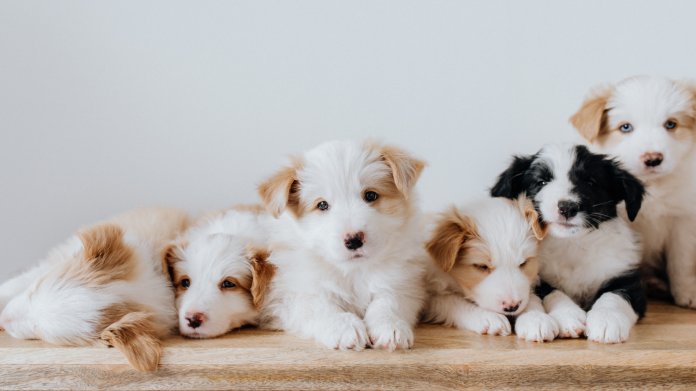Table of Contents
Introduction
Step-by-Step Guides
Takeaways
Introduction
Getting a new puppy will transform your life forever. Puppies are a lot of labor, but they are also a lot of fun. Whether you’re getting your first puppy or need a refresher, you need to know everything.
Step-by-Step Guide
1. Choosing a Puppy
If the moment is right for a puppy, now is the time to choose. Maybe you’ll find your soulmate. Sometimes a puppy happens into your life, and you instantly feel a connection and know it’s the right one. Often, you must go out and find the proper kind of dog for you.
Examine your lifestyle and what you want in a puppy. Is it a purebred or large size? There are also grooming and exercise requirements, temperament, and any health issues to consider.
So, where should you look for your new puppy? Will you adopt your new puppy from a shelter? Maybe you’ll find a responsible breeder. Throughout this process, patience is required. When you find the right puppy, you’ve discovered a lifelong friend.
2. Preparing Your Home for a Puppy
Before bringing your new puppy home, make sure your house is secure for your new dog and valuables. The technique of puppy-proofing a house is comparable to toddler-proofing a house.
First, obtain a puppy’s eye perspective of your home. Electrical wires, poisons, and breakable goods should be stored safely. For safety, store items high up or in a secured cabinet.
Not all “pet-safe” latches work on curious and determined puppies. Lower cabinets and drawers should have locks.
Install sturdy baby or pet gates to keep your puppy out of particular rooms. It is essential to keep your dog away from the stairs, and the kitchen, specifically the garbage can. Pup-proofing keeps your puppy secure and provides you peace of mind.
3. Choosing a Name
When your new dog enters the family, naming him is a priority. You’ll be calling your dog by name for the rest of his life, so pick wisely.
Pick a beautiful ringing name that isn’t too long. It should be easy to speak to and understand for your puppy. In addition, make sure your dog’s name doesn’t rhyme with any words you wish to teach it.
You can name your dog after its personality or appearance. Some want something special. Use your selected name often. Your dog will soon learn and respond to its name.
4. Essential Puppy Gear
You’ll need a few items for your new dog straight away. Many, but not all, of these items are essential to your dog’s well-being. It’s necessary to have a leash, a collar with identification, food and water dishes, and chew toys. Get a comfy dog bed and a crate or kennel.
Many of these things may need to be changed as your puppy grows, but some will last a long time. There is a point at which collars can be altered. A larger kennel can be purchased for future usage, but it must be enclosed to accommodate the puppy with boxes or other items.
It’s also critical to budget for dog-related expenses. Set a spending limit for shopping for your puppy’s essentials and adhere to it. Make a contingency fund in case of unexpected expenses.
5. Feeding Your Puppy
Your puppy’s diet has a significant impact on its long-term health. Before deciding on dog food, do some research. If in doubt or if you have questions, you can consult your veterinarian, pet experts, and experienced dog owners. Avoid disappointment by gradually substituting other foods if your first selection fails to meet your nutritional requirements.
In today’s dog-friendly environment, there are a plethora of diet options. Natural diets are preferred by some owners, while others choose to feed their pets pricey pet chow. Raw and handmade foods are also gaining popularity.
Look at how well the food is made and how much nutrition it contains before buying it. Avoid adult or “maintenance” formulas in favor of growth-promoting meals. The food you feed your dog should be both delicious and healthy.
6. Healthy Puppy Care
Before getting your first puppy, make sure you should find a vet. Take your new puppy to the veterinarian as soon as you get him home for a checkup. As a result, your puppy will not be afraid of the vet’s office.
In the first six months of your puppy’s life, you’ll see your veterinarian. Spaying or neutering a puppy is a standard follow-up to vaccines for the puppy. For the first six months of their lives, puppies should be neutered or spayed.
Early detection of health problems and advice on long-term care for your dog can be provided by your veterinarian. The first time you see your veterinarian, you have the opportunity to speak with them. An animal health insurance policy that pays for up to 80 percent of the costs might cover your dog’s medical expenses.
7. Vaccines for Dogs
Protect your puppy and other pets with anti-viral vaccines. Essential immunizations are needed to replace maternal antibodies in puppies. Puppies need a series of vaccines from the time they are young.
Anti-vaccine people have turned their attention to pet vaccination as a complicated topic. Many veterinary practices are adopting the three-year protocol for older dogs. Vaccine-preventable infections pose a more significant threat to puppies, so they are exempt from these restrictions. These infections can be fatal to your new dog, even being transmitted to people.
In addition to allowing your veterinarian to monitor your puppy’s growth and health, regular vaccinations enable your veterinarian to see your puppy every few weeks. Make an appointment with a veterinarian to learn about your puppy’s vaccine requirements.
8. Building a Puppy’s House
First and foremost, get your new puppy used to going potty outside. Some puppies are more adept at this procedure than other dogs.
As soon as possible, begin house-training your dog. At around 12 weeks old, puppies cannot control their bladder or intestines. Wait a little longer if your pet is a pup.
Getting your puppy on a routine early on is beneficial. As your dog matures and learns to regulate its physiological functions, you won’t have to tell him what to do. It would be best to take your dog to the designated “potty spot” shortly after eating or drinking. Prepare yourself for this challenging task, and remember to be patient.
9. Basic Puppy Socialization
Besides housebreaking, you’ll need to teach your dog other skills. Start by mingling with others. Start with sit, come, and stay after leash training. Some behavioral concerns might be alleviated by teaching puppies fundamental commands.
Puppies are curious, energetic, and in the process of teething. They will probably bite your hand. A suitable toy or chew should be used in its stead. To keep your dog from misbehaving, provide him with something fun to do. Treat or praise your dog if he shifts his attention.
Despite the challenges, puppy training will be rewarding. Structure and self-assurance are two things your dog will gain from a well-built training base. A well-trained dog is a happy one.
10. Your Puppy’s Bonding
Your attachment with your puppy begins when it enters your life and never ends. Enjoying time together, playing, and participating in activities might help to strengthen this link. Sign up for obedience classes, dog sports like agility and flyball, or dog shows.
Participating in animal-assisted therapy is a beautiful way to bond with your dog and let him bond with others. With proper training, your puppy can visit patients in hospitals and nursing homes or assist children in reading and learning. The human-canine link is beneficial to both your and your puppy’s health.
Takeaways
Your family will benefit from the addition of a fun, adventurous, and adorable puppy. Although puppies are a lot of effort, you will be rewarded with an affectionate, loyal, and loving friend if you are dedicated and persistent. Your new dog should be at least eight weeks old when you bring him home. Puppies are typically weaned at eight weeks of age, and it is harmful to separate them from their moms before this time.




